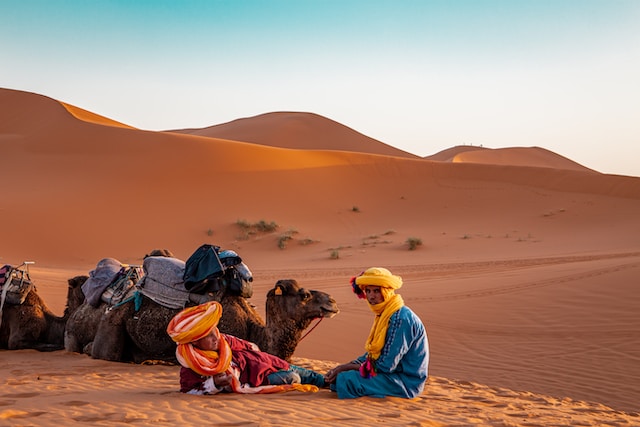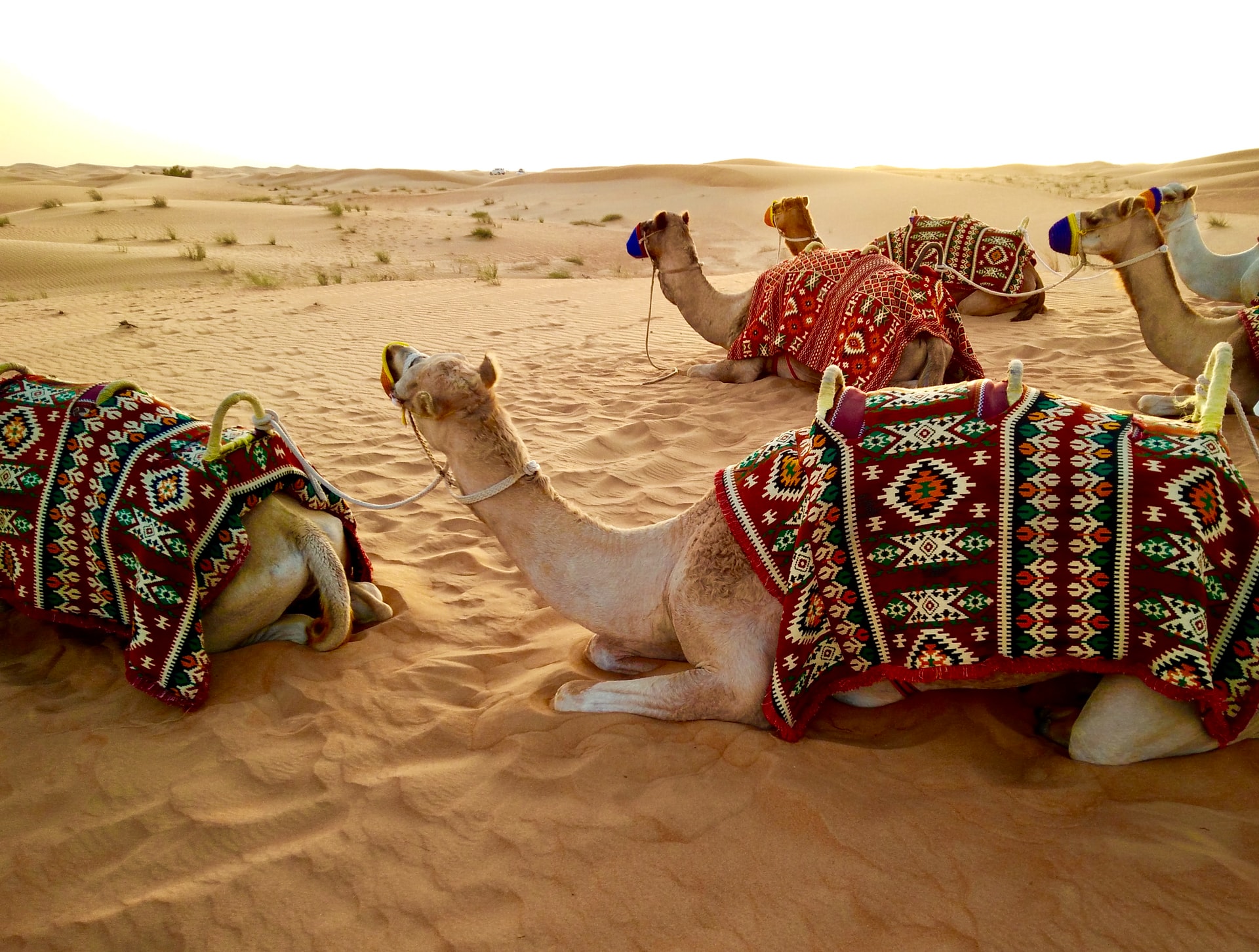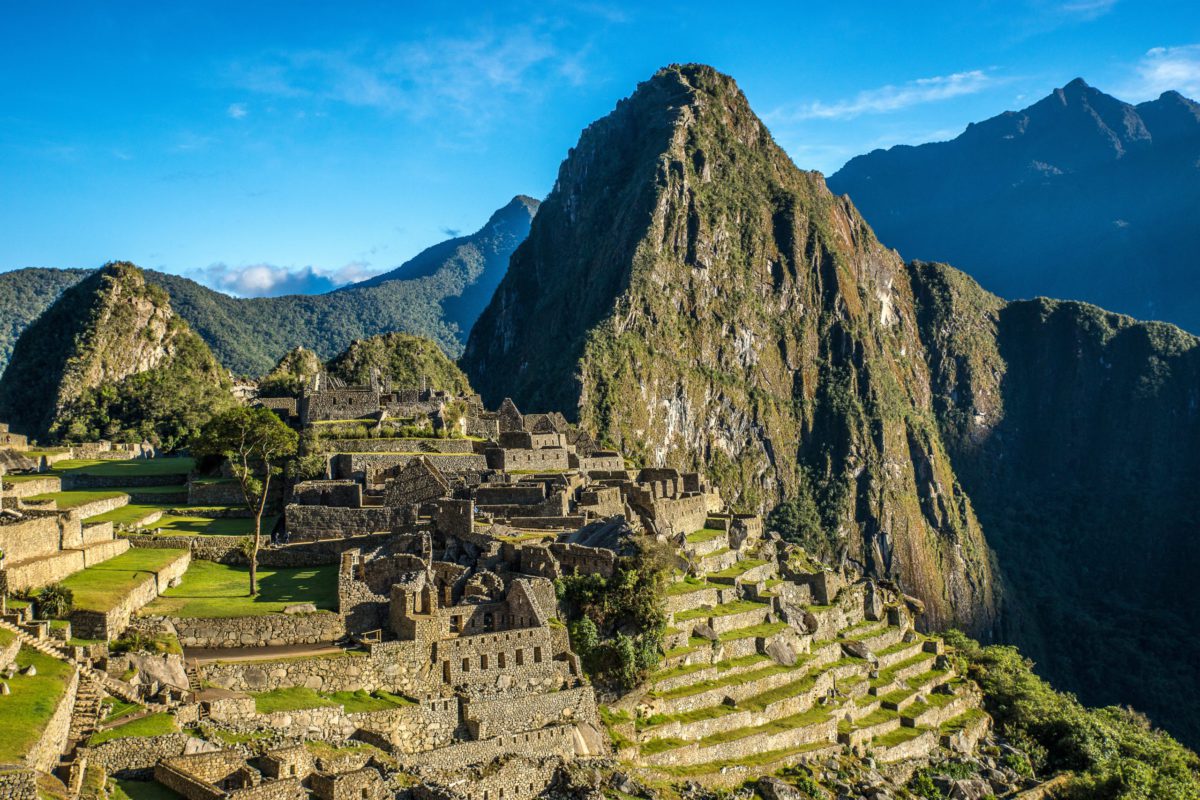Morocco, a country rich in history, culture, and vibrant experiences, has become an enticing destination for wellness retreat groups. Amidst its sweeping desert dunes, majestic mountain ranges, bustling ancient medinas, and serene coastal towns, the nation offers a profound journey towards tranquility and self-discovery.
For those who seek to engage their senses while nurturing their mind, body, and soul, Morocco provides an extraordinary array of opportunities that intertwine cultural immersion with holistic wellness. This quick guide aims to highlight this unique aspect of Moroccan travel.
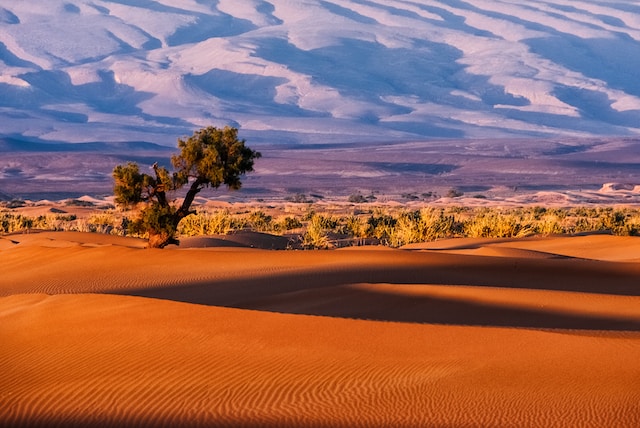
We’ll explore nine essential cultural experiences, from traditional hammam spa visits to participating in age-old Moroccan culinary practices, that will augment your wellness retreat journey and provide you with a profound connection to this remarkable land and its people. These activities serve to not only deepen your understanding of Moroccan heritage but also foster an environment conducive to personal growth and healing.
Join us as we delve into these enriching experiences and unfold a new layer of depth to your wellness journey in the heart of Morocco.
Day-trip, dinner, or overnight camping in the desert
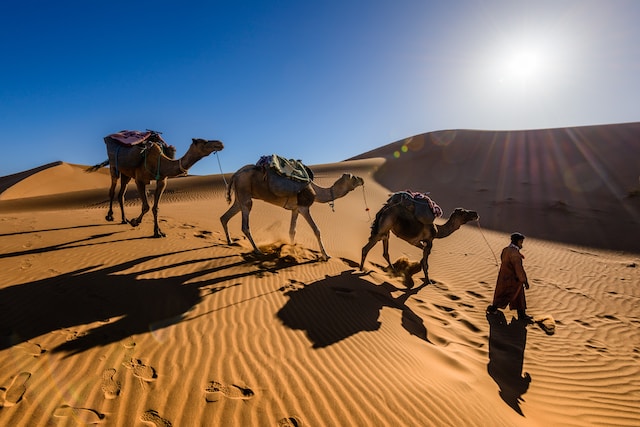
The deserts of Morocco, mainly the Sahara and its fringe areas, hold a distinctive allure and an integral place in the Moroccan cultural narrative. The sands have been a home to nomadic tribes, a crossroads for traders, and a source of inspiration for poets and artists for centuries. Today, they provide visitors with an unfiltered glimpse into the nomadic Berber lifestyle, while also offering a tranquil setting away from the urban hustle.
A day-trip to the desert typically commences from a nearby city such as Merzouga or M’Hamid, embarking on a journey through dramatic landscapes of undulating sand dunes and vast expanses of hauntingly beautiful wilderness. You can also visit Morocco’s rock desert of Agafay, providing the same experience minus the golden sands.
During the day, you might partake in a camel trek, following trails blazed by ancient caravans, or explore the desert in a 4×4, making your way to a desert camp.
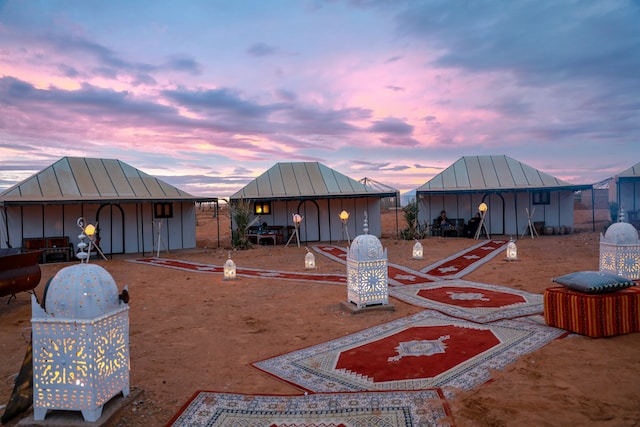
Overnight camping in the desert is an immersive cultural experience where you can delve deeper into Moroccan traditions. As night descends, the desert’s stillness is punctuated by the warm, inviting glow of a campfire. Traditional Moroccan meals, like tagine or couscous, are cooked over open flames, their enticing aromas mingling with the crisp desert air.
Entertainment often takes the form of local musicians playing traditional instruments, such as the lute or drums, their rhythmic beats echoing under the star-lit sky. Tales of Berber folklore are shared, and you’ll have the chance to learn more about the centuries-old nomadic lifestyle that continues to shape Morocco’s cultural identity.
The tranquility of the desert and the simplicity of nomadic life provide a unique backdrop for reflection and introspection, contributing significantly to the wellness experience. Away from digital distractions and the stress of modern life, the desert experience fosters a deep connection with nature and a renewed sense of peace and well-being. From meditation to yoga, a desert visit can add a transformational experience. It offers a stark but breathtaking reminder of our place in the vastness of the natural world, a lesson that stays with visitors long after their footprints in the desert sand have disappeared.
Enjoy a meal with a local Berber family
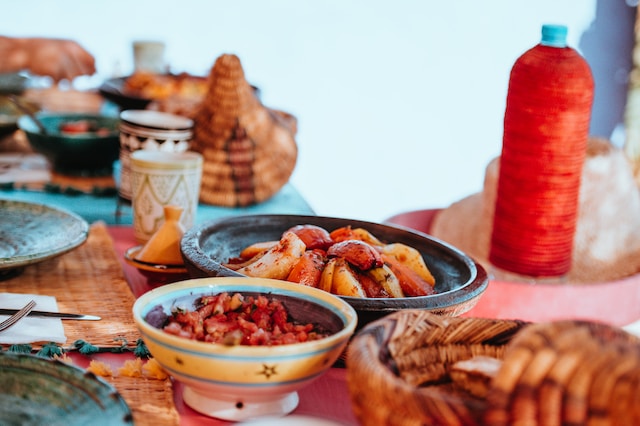
Sharing a meal with a local Berber family in Morocco is a deeply engaging cultural experience that goes beyond the simple pleasure of enjoying traditional Moroccan cuisine. It provides a unique window into the Berber way of life, their customs, hospitality, and the social importance of mealtime.
The Berbers, or Amazigh as they call themselves, are the indigenous people of North Africa, with a history in Morocco dating back thousands of years. Despite the influx of Arab, French, and other influences, the Berber culture remains a robust and vital part of Moroccan identity.
Invitations to share a meal with a Berber family are a showcase of Moroccan hospitality and an expression of respect and goodwill. It offers a unique chance for visitors to step inside a traditional Berber home, often a simple but cozy setting. The dwellings, be it in rural Atlas Mountain villages or desert communities, reflect an intimate relationship with the natural environment, often constructed using locally sourced materials like mud, straw, and stone.
Food in Morocco is not merely sustenance; it is a celebration, a social event, and a way to welcome guests. The experience often begins with the Moroccan ritual of handwashing before a meal. This is followed by an array of delicious dishes, prepared and served with great care. Meals often start with a variety of salads, followed by the main course like a tagine or couscous, laden with locally grown vegetables, meats, and fragrant with traditional Moroccan spices.
While dining, you’ll likely engage in rich conversations about the family’s history, community life, and cultural traditions. Such interactions offer an invaluable and authentic understanding of the Berber lifestyle and values, from their deep-rooted respect for nature to their emphasis on community and familial ties.
Immersing oneself in these intimate local encounters adds a profound layer to the wellness journey. It fosters a sense of belonging and connection to a culture and people that one might not otherwise have the chance to experience. Moreover, the simple act of sharing a meal reminds us of the universal human ties that bind us all, regardless of our diverse backgrounds, promoting empathy, understanding, and wellness in a broader, holistic sense.
Cooking class
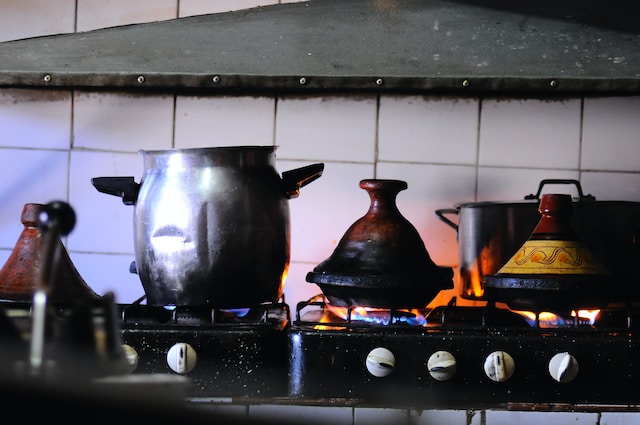
Participating in a Moroccan cooking class, whether in a family’s home or a local restaurant, is a highly interactive way to immerse oneself in the country’s rich cultural and culinary traditions. The experience serves not only to broaden your palate and cooking skills but also to deepen your understanding of the Moroccan way of life.
Food holds a central place in Moroccan culture. It’s an expression of the country’s diverse history, geography, and the creativity of its people. Moroccan cuisine is a delectable blend of Berber, Arab, Andalusian, and Mediterranean influences with a unique local twist. Each dish tells a story of the past and the present, the land, and the people.
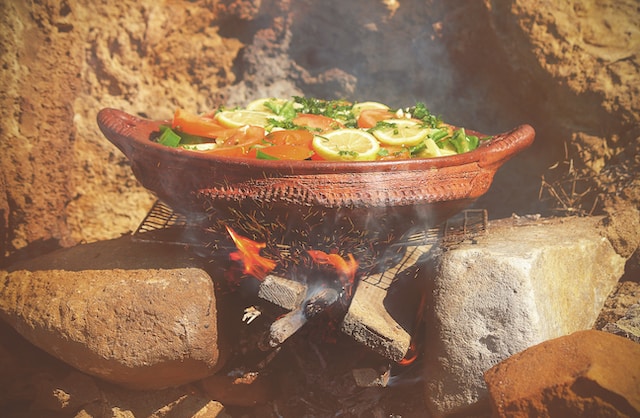
A cooking class in Morocco typically involves more than just cooking. It often starts with a visit to a bustling local market, or ‘souk’. Here, you’re introduced to the vivid palette of spices, fresh produce, and local specialities integral to Moroccan cuisine. Learning how to select the best ingredients and navigate the energetic market scene is a cultural experience in itself.
In the cooking process, you’ll learn about and prepare traditional Moroccan dishes such as tagine, couscous, pastilla, or harira. The experience provides a hands-on understanding of the delicate balance of spices and flavors, the preparation methods, and the patience and love involved in Moroccan cooking.
This intimate culinary experience often culminates in sharing the meal you’ve prepared, providing a satisfying sense of achievement. The conversations over the meal can offer insights into local traditions, family life, and the social importance of food in Moroccan culture.
Incorporating a cooking class into a wellness retreat schedule in Morocco can be a source of multiple benefits. Firstly, it is an engaging way to connect with the local culture and people. Secondly, understanding the nutritional value of what you eat, and how it’s prepared, promotes mindful eating, a key aspect of wellness. Moreover, cooking is a therapeutic activity, offering a form of creative expression, relaxation, and the gratifying reward of a meal at the end. Lastly, the skills and knowledge gained from a cooking class stay with you long after the retreat, enhancing your personal culinary repertoire and allowing you to recreate a piece of Moroccan culture in your own kitchen.
Visit a carpet shop for a weaving demonstration
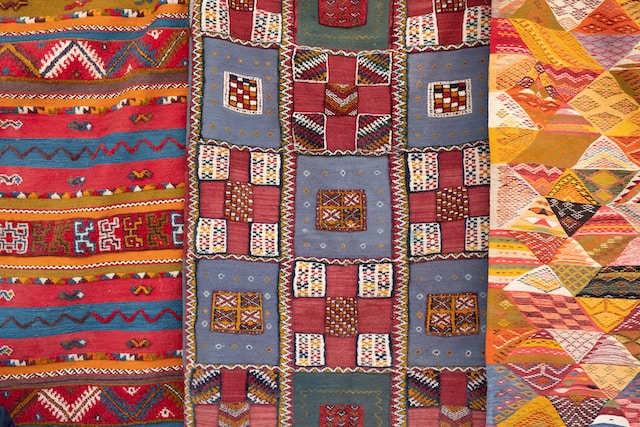
Visiting a carpet shop in Morocco is not merely a shopping excursion, but a sensory immersion into a centuries-old artistic tradition. Carpets hold significant cultural, economic, and symbolic importance in Moroccan society. They are a testament to the country’s rich history, diverse tribes, and distinct artistic expressions.
Moroccan rugs are renowned worldwide for their quality, intricacy, and the storytelling imbued in their patterns. Each region, and often each tribe, has its distinct style, patterns, and colors. From the bold geometric designs of the Beni Ourain tribe to the colorful and intricate motifs of Boujad or Azilal, each rug is a unique work of art. Moreover, the weaving of these carpets, traditionally done by women, is an ancient craft passed down through generations.
When you visit a carpet shop in Morocco, you are often welcomed with traditional Moroccan hospitality. A customary cup of mint tea is served as a warm gesture of welcome, and you are introduced to a variety of carpets, each with a story of its own. Shopkeepers, skilled in their trade, narrate the history, meaning of the symbols, the tribe it comes from, and the time taken to create each piece.
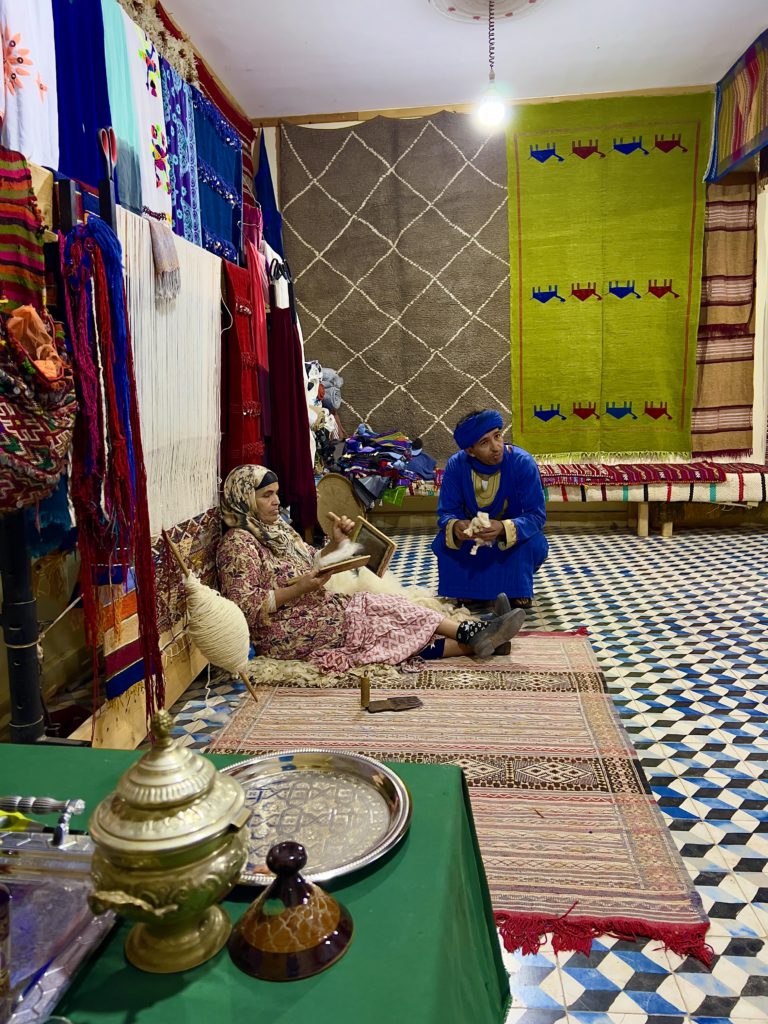
Incorporating a visit to a carpet shop in a wellness retreat schedule provides a unique form of cultural and artistic therapy. Firstly, it deepens your understanding of Moroccan history, tribes, and the symbolism in their art. Secondly, the visual delight of patterns, textures, and colors, and the narratives they carry, stimulate creativity and artistic appreciation.
Moreover, interacting with local artisans or shopkeepers facilitates connection and mutual understanding, a key aspect of personal wellness. It also provides an opportunity to support local craftsmanship and the economy. Lastly, the mindful exercise of choosing a carpet allows for personal reflection; each piece resonates differently with each individual, often mirroring their taste, personality, or even their current life journey. Owning a Moroccan rug is like having a piece of Moroccan history and culture with you, a treasured souvenir that keeps the memory of the wellness retreat alive.
Food tour through the markets of Marrakech
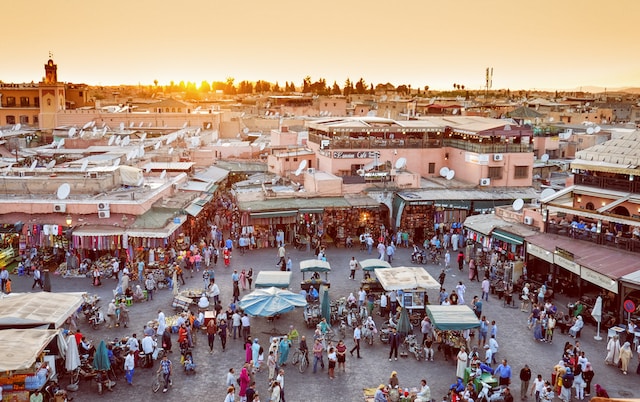
Embarking on a food tour through the markets of Marrakech, also known as ‘souks,’ offers a sensory journey through the heart of Moroccan culture and gastronomy. The winding alleyways of the Medina are laden with food stalls and shops, each offering a unique taste of the country’s rich culinary tapestry.
Marrakech, being one of Morocco’s imperial cities, boasts a vibrant food scene that reflects the city’s historical and cultural influences. A food tour here provides a unique opportunity to delve into the traditional flavors of Morocco, from the tantalizing street food like Msemen and Maakouda to the richly spiced tagines and the sweet delicacies like Chebakia.
The cultural significance of this experience lies not only in the food but also in the exploration of the market itself. Each souk has its rhythm, its distinctive aura, and its charm. The labyrinthine layout, the bustling energy, the kaleidoscope of colors from various goods, and the enticing aromas of different spices and food make for an enchanting experience.
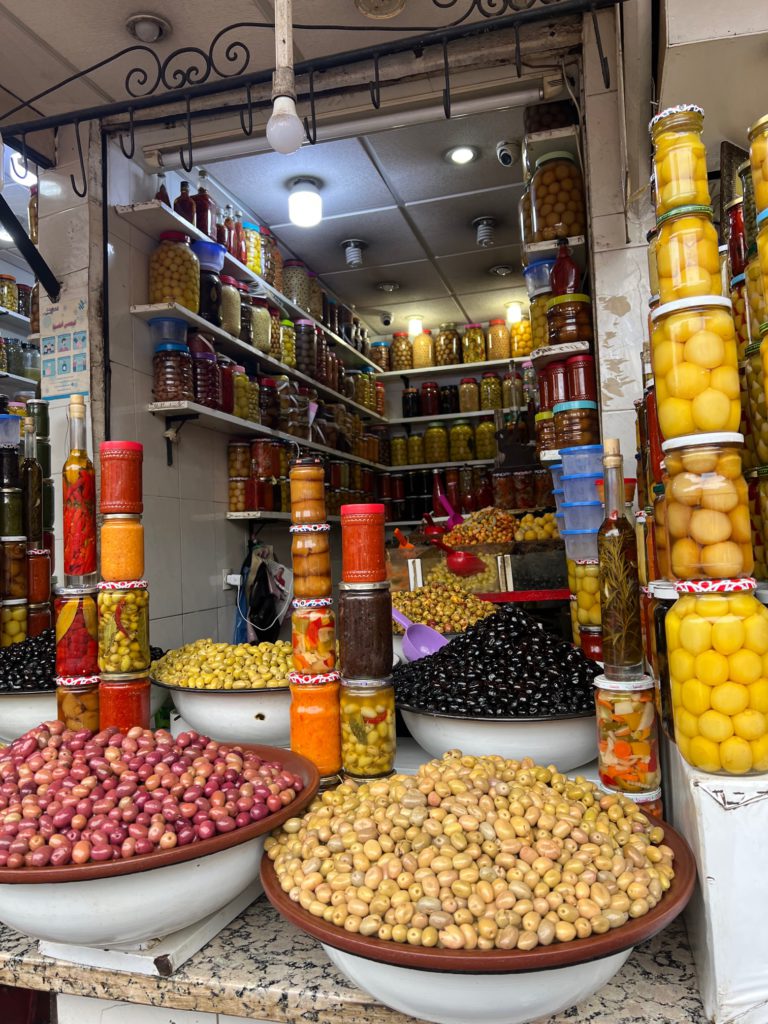
Local vendors passionately share the stories behind their goods, whether it’s the family recipe for a particular dish, the source of their ingredients, or the traditional methods of preparation. This narrative journey enhances the tasting experience and offers a greater appreciation of Moroccan culinary traditions and their place in the community’s daily life.
In the context of a wellness retreat, a food tour through Marrakech’s markets serves multiple purposes. It is a cultural immersion activity that fosters connection with local people, traditions, and gastronomy. It’s an adventure that stimulates all senses, a key aspect of mindfulness and living in the present moment.
The exploration of local cuisine can also offer insights into the nutritional aspects of Moroccan food and foster an appreciation for the diversity and richness of different culinary traditions. Finally, food tours, by their nature, promote physical activity – walking through the markets, engaging with the environment, and exploring different places are all aspects of active and experiential learning, contributing to both physical and mental wellness.
Visit a local women’s cooperative
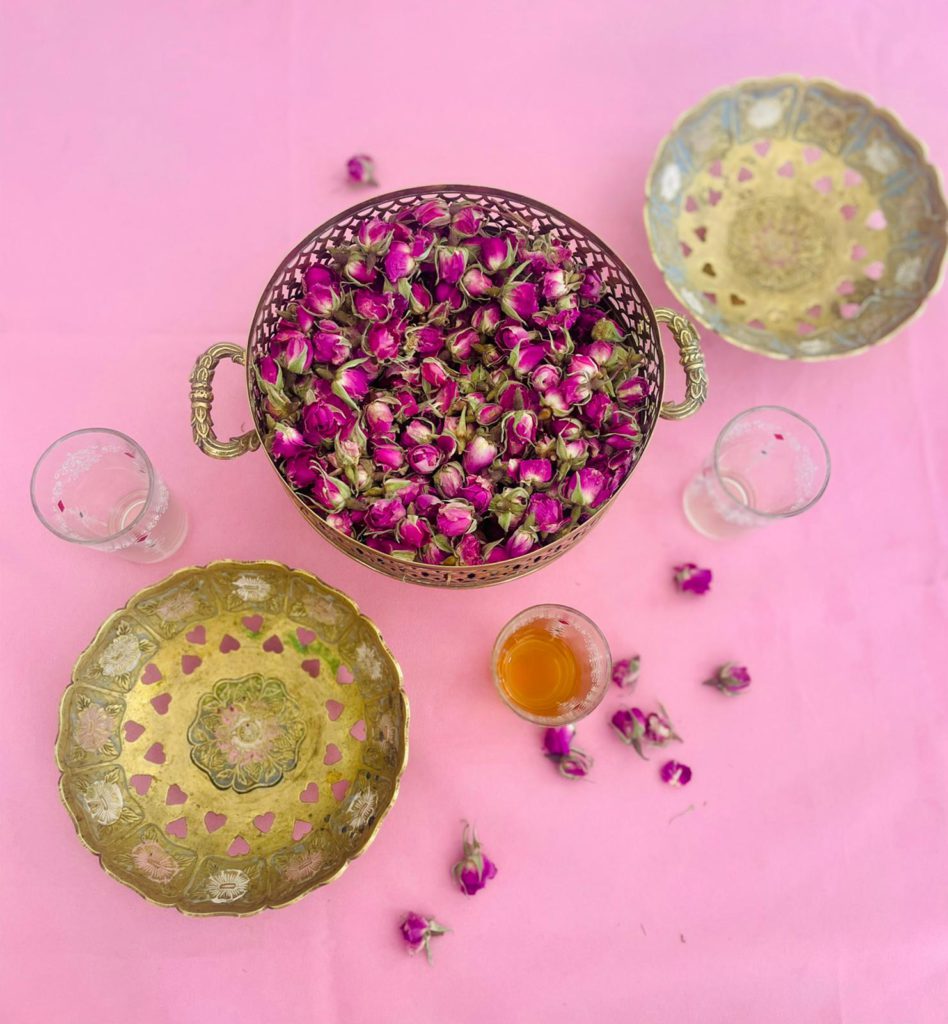
Women’s cooperatives throughout Morocco hold a profound cultural and socio-economic significance. They are primarily engaged in the production of traditional Moroccan products like argan oil, rose water, saffron, and others. These cooperatives serve as a vital tool for economic development and women’s empowerment, particularly in rural areas.
The cooperatives have been instrumental in preserving traditional Moroccan methods of production while also promoting sustainability. For instance, the extraction of argan oil, one of Morocco’s most famous exports, is a labor-intensive process traditionally done by hand. This labor is typically carried out by women in the region, and the establishment of cooperatives has ensured fair wages and safe working conditions for them.
Similarly, in the valleys of the High Atlas Mountains, you’ll find cooperatives focused on the production of rose products. Women here distill rose petals to create rose water, a product deeply embedded in Moroccan culture and used widely for its aromatic and therapeutic properties.
The production of saffron, one of the world’s most expensive spices, is another activity typically managed by women’s cooperatives. In the town of Taliouine, known as the saffron capital of Morocco, these cooperatives not only produce and sell saffron but also promote sustainable farming practices and contribute significantly to the local economy.
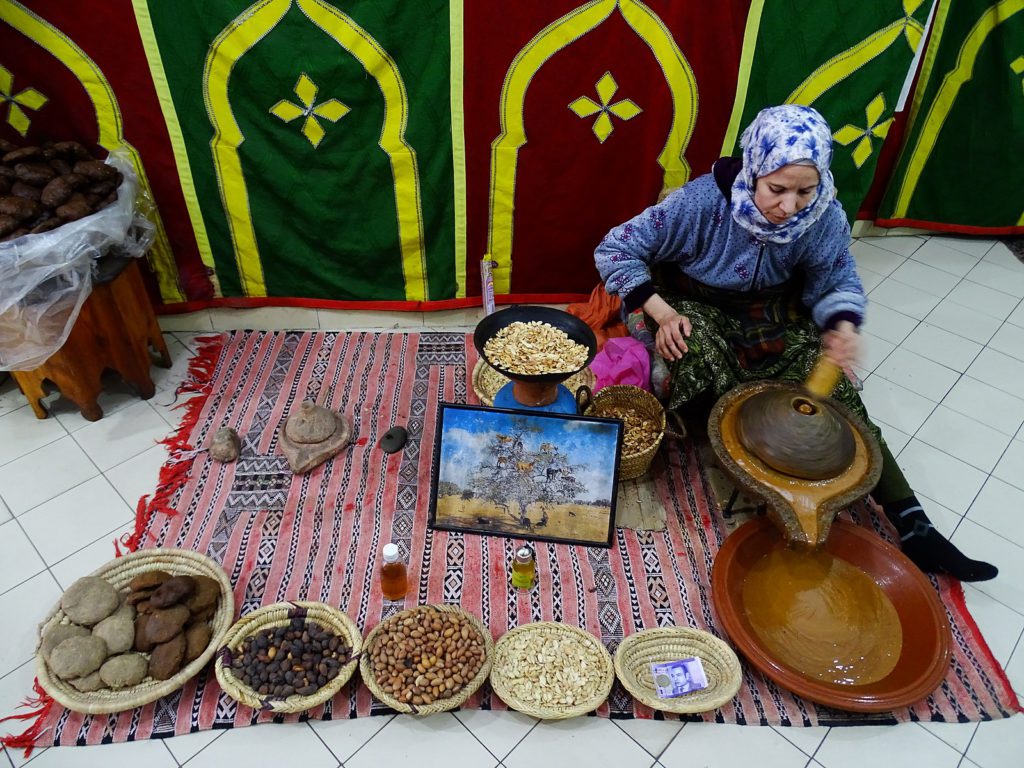
A visit to one of these cooperatives during a wellness retreat can provide a rich and immersive cultural experience. It allows you to observe traditional production methods, engage with the local women, and learn about their work, their stories, and their contributions to Moroccan society. It’s also an opportunity to understand the significance of these natural products and their uses in Moroccan cuisine, skincare, and traditional medicine.
From a wellness perspective, such an experience encourages mindful consumption – understanding where products come from, how they’re made, and the impact of their production. It supports the principles of sustainability and fair trade. The interactions foster a sense of connection and empathy with the local community, enriching the overall wellness journey. Furthermore, the purchase of these cooperative-produced goods not only supports the local economy but also provides you with natural, high-quality products to incorporate into your wellness routine.
Tour a local mosque
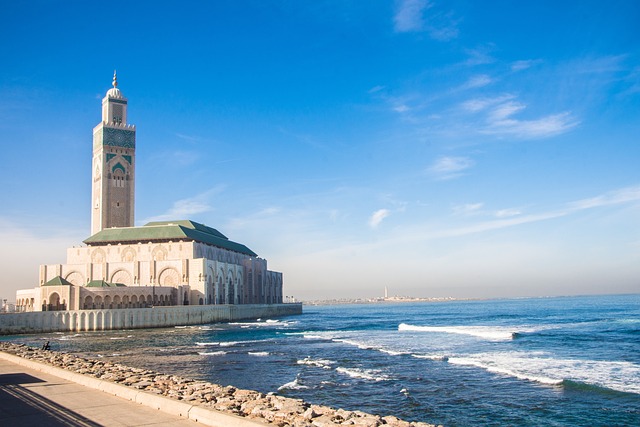
Mosques hold a central place in Moroccan society, both as places of worship and as significant cultural and architectural landmarks. They are testaments to the country’s deep Islamic roots and its rich architectural heritage. Each mosque, with its distinctive features – the towering minarets, intricate tilework, beautifully carved wood, and stucco work – tells a story of the place and period in which it was built.
Touring a local mosque in Morocco provides a deep understanding of Moroccan religious practices, architectural styles, and historical influences. It offers a glimpse into the spiritual life of the community, the Islamic traditions, and the rhythm of daily life centered around the call to prayer.
One of the most famous mosques to visit in Morocco is the Hassan II Mosque in Casablanca, one of the largest mosques in the world. Its grandeur and the exquisite details reflect the zenith of Moroccan and Islamic craftsmanship. However, it’s important to note that non-Muslims are typically not allowed inside most mosques in Morocco, with some exceptions like the Hassan II Mosque and the Tin Mal Mosque.
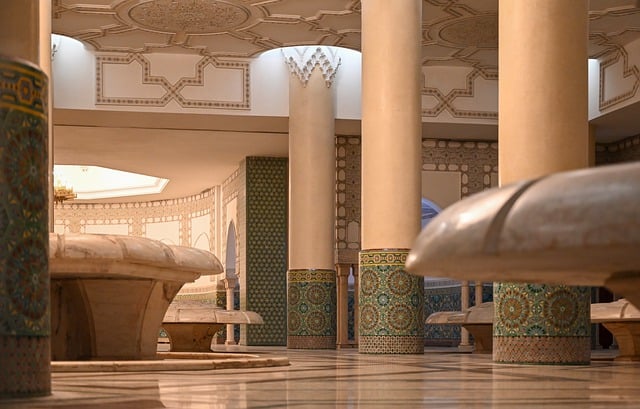
Including a mosque tour in a wellness retreat schedule can enhance the spiritual aspect of the wellness journey. Even if one doesn’t subscribe to the Islamic faith, the tranquility, the call to prayer, and the overall spiritual ambiance can provide a space for introspection and peace.
Understanding the cultural and religious practices of other communities promotes mutual respect, empathy, and cross-cultural appreciation – all of which contribute to personal growth and emotional wellness. It encourages a broader perspective of the world, fostering a sense of unity in diversity.
Finally, the appreciation of the architectural beauty and craftsmanship of these mosques can be a form of aesthetic therapy, stimulating the senses and promoting a sense of awe and wonder. The intricate designs, symmetry, and use of colors offer a visual treat and can serve as an inspiration for those interested in art and architecture.
Hike with a Berber guide
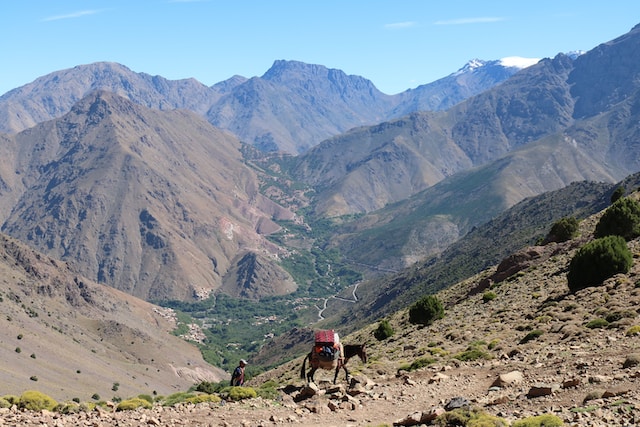
Hiking in the Atlas Mountains or the various valleys of Morocco with a local Berber guide is a unique cultural and natural experience that is deeply entwined with the country’s landscape and its indigenous people. The Atlas Mountains, stretching over 2,500 km across Morocco, Algeria, and Tunisia, have been the home of the Berber people for millennia.
A trek through this rugged landscape offers a unique window into the life of the Berber tribes, who have adapted to this mountainous environment, carving out a living from its slopes and valleys. The scenery is breathtaking, from the snow-capped peaks, the cascading waterfalls, the fertile valleys, to the traditional Berber villages with terracotta-hued homes blending seamlessly into the landscape.
A local Berber guide brings depth and authenticity to the hiking experience. They share insights into the local flora and fauna, the traditional Berber farming techniques, the tribal customs, their community life, and the legends that have been passed down through generations. They also help facilitate respectful encounters with local communities, which might involve sharing a cup of mint tea or a meal, providing trekkers with an intimate cultural exchange.
Incorporating such a hike into a wellness retreat schedule offers manifold benefits. Physically, hiking is a form of exercise that boosts fitness levels, releases endorphins, and promotes cardiovascular health. It also exposes you to fresh air and sunshine, which can have a significant positive effect on mood and vitamin D levels.
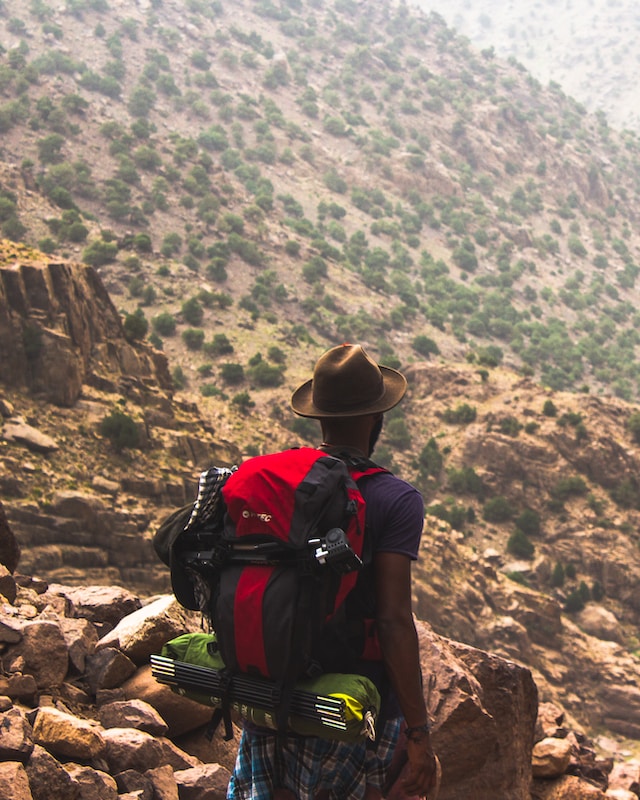
From a mental wellness perspective, hiking in the natural beauty of the Atlas Mountains provides a break from digital distractions and promotes mindfulness. The serenity of the mountains can offer a much-needed space for reflection, fostering a sense of peace and mental clarity.
Culturally, this experience allows for a deep connection with the land and its people. Understanding and respecting their ways of life contributes to personal growth and broadens worldviews. It cultivates empathy, respect, and a sense of global citizenship.
Moreover, trekking with a local guide supports responsible tourism by contributing to the local economy and encouraging the preservation of traditional knowledge and customs. The combined effect of physical activity, cultural immersion, and natural beauty makes hiking in the Atlas Mountains a holistic wellness experience.
Get pampered at a traditional hammam
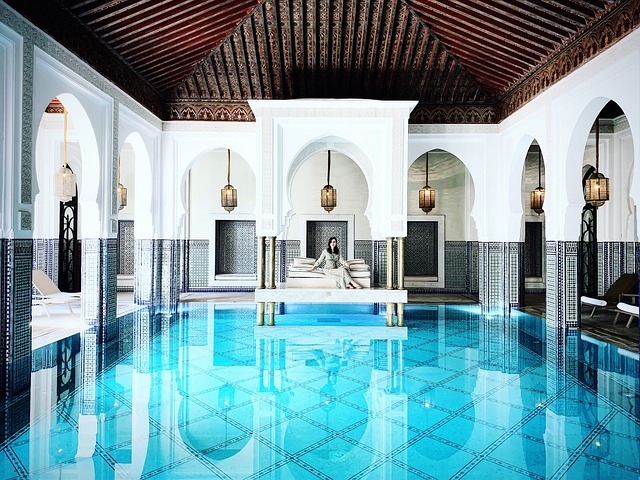
Hammams, or public bathhouses, have been an integral part of Moroccan culture and daily life for centuries. Rooted in Islamic traditions, hammams serve as both a place for ritual purification and a social hub, where people gather to relax, socialize, and celebrate special occasions.
A visit to a traditional hammam is an immersive multi-step process. It starts with relaxation in a warm room, which allows the body to adjust to the heat and begin the detoxification process. This is followed by a visit to a hotter steam room, which opens the pores and readies the skin for the scrubbing phase. Here, the use of a ‘kessa’ glove and traditional Moroccan black soap made from olives and eucalyptus helps to exfoliate the skin, removing dead skin cells and impurities. After rinsing, some hammams offer a final stage of relaxation in a cooler room, often with a soothing application of argan oil or a clay ‘ghassoul’ mask.
The hammam experience is deeply ingrained in Moroccan society. It has been passed down through generations and holds cultural significance in its embodiment of community, cleanliness, and wellness. Historically, hammams have also been a place for women to socialize freely, celebrate life events like weddings, and pass down wellness traditions.
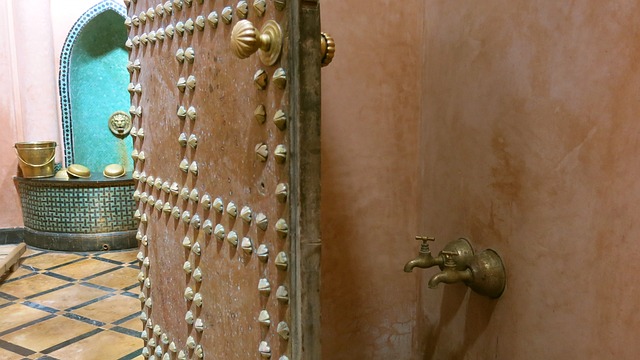
Incorporating a hammam experience into a wellness retreat schedule can greatly contribute to a holistic wellness journey. Physically, the hammam ritual aids in detoxification, improves circulation, and rejuvenates the skin, leaving it glowing and revitalized. The steam and warmth can also soothe aching muscles and joints, and promote a good night’s sleep.
Mentally, the hammam experience can be incredibly relaxing, offering a refuge from the hustle and bustle of daily life. It’s a space for mindfulness and self-care, reducing stress levels and inducing a state of tranquility.
On a cultural level, visiting a hammam provides a deep understanding of Moroccan traditions and a unique chance to engage in a practice that has bonded Moroccan communities for centuries. The opportunity to interact with locals in this shared ritual can enrich the cultural immersion aspect of the wellness retreat. Additionally, supporting traditional hammams contributes to the local economy and the preservation of this age-old wellness tradition.
Interested in becoming a retreat host and getting paid to do what you love? Start planning here!
About TourHero
TourHero is a social travel platform that enables you to travel with like-minded people and fall in love with the journey. We work closely with handpicked local operators to ensure every experience curated is unique and exclusive to your travel group. Come with us on epic adventures and create memories that last a lifetime. Get started here!
